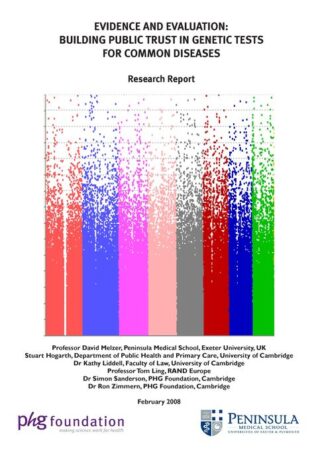Home Publications Reports Evidence and evaluation: building public trust in genetic tests for common diseases
Evidence and evaluation: Building public trust in genetic tests for common diseases
This independent academic research report focuses on the factors influencing how new genetic tests for common disease susceptibility enter routine clinical practice, and at the need for appropriate clinical evaluation.
In the past most genetic tests were for single-gene disorders in which having the gene variant was synonymous with having the target condition. Recent genome wide studies have identified a rapidly expanding set of robustly proven associations between inherited gene variants and common diseases. There have been exciting findings for diseases including myocardial infarction, diabetes, age-related macular degeneration, asthma and several auto-immune conditions.
However, while some of the emerging markers have moderate or larger effect sizes, suggesting a reasonably strong association between the marker and the disease, many indicate only small degrees of risk. This picture is further complicated by many earlier exploratory analyses which suggested associations between hundreds of variants and disease states, most of which have subsequently proved weak or absent altogether.
Relatively cheap laboratory assays can now identify genetic variants in individual samples and in large collections. Innovation and development in genetic testing increasingly lie in establishing the clinical significance of assay results: establishing what a positive or negative result actually means, and what to do about the result in individual patients. Many of the emerging genetic assays appear to have the potential to become useful clinical tests for estimating future risk of common diseases, particularly in diagnosis, estimating risk, guiding treatment, and determining prognosis.
Formal research is needed to identify the clinical uses to which these markers could be validly and usefully applied: in most cases the current scientific evidence statistically linking variants to complex disease is not sufficient to support clinical use.
By David Melzer, Stuart Hogarth, Kathy Lidell, Tom Ling, Simon Sanderson, Ron Zimmern

